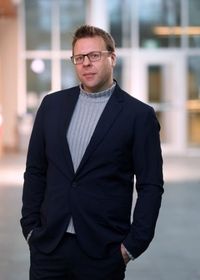

Phillip (he/him) is a registered dietitian with the Nova Scotia Dietetic Association (NSDA). His research interests are driven by his own experiences as part of the 2SLGBTQ+ community. His research perspective is through the lens of poststructuralism and queer theory and provides both a personal and political perspective on the topic of nutrition, gender, sexuality, nutrition pedagogy, and health. His research often uses arts-based methodologies, such as photography and comics, that can disrupt the foundations of nutrition and health research. He is currently working on two film projects - one entitled "Wicked Bodies" about eating disorders in the 2SLGBTQ+ communities and the other called "Pup Philms" exploring body image within the queer pup community (SSHRC-funded). He is also exploring the meaning of compassion within 2SLGBTQ+ communities and will be producing a comic anthology from the results (SSHRC-funded). He was co-editor to Rainbow Reflections: Body Image Comics for Queer Men. He can be contacted at phillip.joy@msvu.ca
Across the nutrition profession, collectively we are trying to work towards creating a culture of equity, which includes learning and understanding power imbalances that contribute to nutrition inequities that exist in the field of nutrition, nutritional practice and research, and within the food system. For example, in Canada, dietitians are trained and practice through a set of professional competencies, known as the Integrated Competencies for Dietetic Education and Practice (ICDEP), and are mandated to "practice within the context of Canadian diversity," which is noted to include gender and sexual orientation. This session aims to discuss gender diversity and sexual orientation priorities within the fields of nutrition and will challenge cis- and hetero-normativity to address the needs of gender and sexually diverse groups such as the 2SLGBTQ+ communities
By the end of this panel, the learner will be able to: